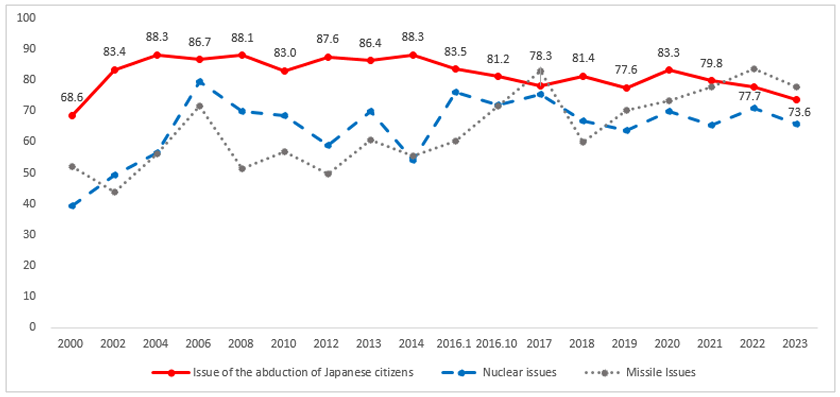Shifting Sands: Examining the Abduction Issue and Prospects for Japan-DPRK Dialogue
- Commentary
- May 23, 2024

- Eunmi CHOI
- Research Fellow, Asan Institute for Policy Studies

Eunmi Choi, a research fellow at the Asan Institute for Policy Studies, emphasizes the Japanese public's focus on the abduction issue and suggests this could be a desirable chance for Prime Minister Kishida to significantly boost his low approval ratings. Crediting Japan's diplomatic accomplishment in securing President Biden's support for Japan-DPRK dialogue to its persistent emphasis on the abduction issue, Choi points out that initiating bilateral talks could further enhance Japan's role in the U.S.-DPRK relations. Choi highlights that this could potentially marginalize the ROK in Korean Peninsula affairs and urges South Korea to bolster its cooperation with Japan and the U.S. to effectively address North Korea and avoid being sidelined.
Is Japan-North Korea (DPRK) summit on the horizon? Recent discourse from both Japan and DPRK regarding a potential leaders’ summit has drawn global attention and speculation about its feasibility. Despite a strong rejection from North Korea in March that dampened expectations, support from President Biden during Prime Minister Kishida Fumio’s official visit in April, along with Kishida’s reaffirmed commitment, suggests that the summit remains a viable option. If it were to materialize, it would have significant implications for neighboring countries’ interests in the North Korean nuclear problem. What is the abduction issue that Japan is primarily focusing on, and why is it so central to the North Korea problem? What will the future hold for Japan-DPRK relations, the so called “last puzzle piece” of Northeast Asia? This article examines Japan's expectations and objectives in pursuing changes in its bilateral relations with North Korea and explores the potential future of these interactions.
I. Reevaluating the Prospect of DPRK-Japan Dialogue: A Year in Review
Signs of change in Japan-DPRK relations appeared approximately a year ago. In March 2023, following the announcement of the South Korean government's “solution” to the forced labor issue, relations between South Korea and Japan began to improve as shuttle diplomacy resumed. Meanwhile, at a Citizen’s Rally in May to demand the immediate return of all abductees, Prime Minister Kishida announced that the Japanese government would engage in “high-level consultations... to bring about summit-level talks at an early time” (Prime Minister’s Office 5/27/2023). Shortly thereafter, North Korea signaled its willingness to engage, stating, “there is no reason for the DPRK and Japan not to meet” (KCNA 5/29/2023). While the issue of abductees highlighted the differences between the two countries, it also came to light that discreet interactions had occurred between them in March and May in third countries in Southeast Asia.
The prospect of a Japan-DPRK summit re-entered the spotlight in January 2024 when Kim Jong Un sent a letter of condolence to Kishida following the earthquake on the Noto Peninsula. Kishida responded by reiterating his readiness to engage in a summit and high-level consultations directly under the Prime Minister's office, thereby heightening expectations for diplomatic progress. Despite this positive momentum that lasted for a few months, the discussions seemed to regress to their initial stages, with Japan emphasizing the resolution of the abduction issue and North Korea maintaining that the matter has been conclusively addressed. Nonetheless, Japan's persistent readiness to engage in dialogue with North Korea remains significant.
II. Japanese Perspective on the DPRK Question and the Abduction Issue
According to the results of the annual “Public Opinion Survey on Diplomacy” conducted by the Cabinet Office in Japan, it is clear that Japanese interest in the North Korean issue predominantly focuses on the abduction issue and nuclear/missile issues, as illustrated in Figure 1 below.
[Figure 1] Trends in Japanese Public Interest Towards North Korea (2000-2023)

Source: Public Relations Office, Cabinet Office of the Government of Japan.
Data derived from the “Public Opinion Survey on Diplomacy.” Compiled by the author.
In this context, the abduction issue that Japan persistently emphasizes revolves around the case of Japanese citizens, notably exemplified by Megumi Yokota, a middle school girl kidnapped from Niigata Prefecture in the 1970s. Throughout the late 1970s and early 1980s, several Japanese citizens disappeared, with many believed to have been abducted by North Korea. This issue was officially brought up during the 1991 Japan-DPRK normalization talks; however, North Korea initially denied the allegations, halting progress. The matter significantly worsened Japan's view of North Korea and escalated public demand for resolution, making it a central focus in bilateral relations.
During the first Japan-DPRK summit in 2002, Kim Jong Il, then Chairman of the National Defense Commission of North Korea, acknowledged the abductions for the first time, promising “to punish those responsible and to prevent any recurrence, ... [and] facilitate … the return of abductees to Japan” (MOFA Japan 2021). Despite this, many victims had already passed away. Public outrage in Japan further intensified upon the discovery that the remains of Megumi Yokota, sent by North Korea, were falsified. Although discussions regarding the abductions have persisted, efforts toward resolution have been largely unsuccessful. These efforts have been stymied by Japan's increased economic sanctions in retaliation to North Korea's nuclear and missile tests, and by North Korea's sluggish investigation. As a result, the abduction issue, which has garnered nationwide attention, remains unresolved.
During this process, the abduction issue has evolved and been perpetuated as a significant political and social matter in Japan, becoming both a major point of contention and a precursor to Japan-DPRK relations. It has essentially set the standard for Japan's policy towards North Korea. Japan prioritizes the abduction issue above all others in its dealings with North Korea, viewing it as both the entry point and a critical benchmark in managing the bilateral relations. Consequently, it is perceived as a challenge that must be tackled alongside the North Korean nuclear issue. For Japan, meaningful engagement with North Korea is contingent upon tangible progress on the abduction issue. From a diplomatic perspective, this issue not only facilitates bilateral engagement with the DPRK but also positions Japan as a victim in the complex relations marred by various issues, including historical disputes.
III. The Future of Japan-DPRK Relations and South Korea
While Japan-DPRK relations present an opportunity for Prime Minister Kishida—who is grappling with exceptionally low approval ratings—to potentially boost his political standing, it remains a challenging issue requiring tangible outcomes. Nevertheless, Kishida’s continued interest in the North Korean issue and the prospect of a summit with Kim Jong Un paradoxically signal his confidence in diplomacy and underscore the urgency of these negotiations. Kishida’s approval ratings have steadily declined during his tenure, exacerbated by scandals involving the Unification Church and political financing, as well as the unpopularity of his economic and social security policies. This leaves diplomacy as his main strategy for political recovery.
With a strong background in diplomacy, including over four years as the Minister of Foreign Affairs under the Abe Cabinet, Kishida has shown considerable prowess in this field. The Japan-U.S. relations reached new heights as global partners after the summit in April, and relations with South Korea have begun to normalize after years of tension. Dialogue with China, which had been strained over disputes concerning the Fukushima treated water discharge, has also resumed. In this context, it is no exaggeration to state that North Korea remains the only outstanding issue in its diplomatic framework. If Kishida can make progress in relations with North Korea before the Liberal Democratic Party leadership election in September 2024, it would greatly benefit his bid for reappointment. Additionally, the aging of the families of the abductees adds urgency to resolving these issues.
During his official visit this year, Kishida successfully secured President Biden’s support for the Japan-DPRK dialogue. Although Biden has demonstrated considerable interest in this issue, evidenced by his meeting with the families of the abductees during his visit to Japan in 2022, it was not until April of this year that he officially endorsed Japanese talks with the DPRK. This not only marks a triumph for Japanese diplomacy, which has long advocated for resolving the abduction issue, but also signals a potential shift in future relations between Japan and North Korea.
However, reconciling the differing perspectives of Japan and North Korea on the abduction issue remains a formidable challenge. Despite this, the issue could serve as a catalyst for a Japan-DPRK summit and potentially enhance Japan's role in the North Korea-U.S. relationship.
The evolving relationship between Japan and DPRK complicates the situation for South Korea. While ROK, Japan, and the United States jointly address the North Korean nuclear threat, the specific roles and circumstances of each country vary. While ROK supports bilateral dialogue to resolve the longstanding abductee issue, there is concern that ROK might be marginalized in confidential contacts between the two parties.
Complete resolution of the abduction issue will be challenging due to significant differences in perception. Nevertheless, ROK must prepare for potential progress. Unlike Japan, which has pursued resolution of the abductee issue for decades, ROK has not only failed to raise public expectations for a positive outcome but has also struggled to elevate this as a social issue. Thus, any improvement in Japan-DPRK relations directly and indirectly affects ROK.
Should a summit between Kishida and Kim Jong Un take place, the nuclear issue might also be addressed. Japan's foreign policy, which is closely tied to the U.S.-Japan alliance, is unlikely to diverge significantly from that of the U.S. However, ROK might see its role diminished if Japan starts to influence U.S.-DPRK relations using the abduction issue as a conduit. Such an outcome would be unfavorable for both ROK, a crucial player in Korean Peninsula affairs, and the U.S., a key stakeholder in denuclearization talks.
In sum, ROK, the U.S., and Japan must develop a unified strategy to address North Korean nuclear, abduction, and human rights issues. By closely monitoring shifts in Japan-DPRK relations, the three parties should share information through close communication and mutual trust, and synchronize their approach to comprehensively tackle the challenges posed by North Korea.
References
Korean Central News Agency (KCNA). 2023. “Vice-Minister of Foreign Affairs of DPRK Issues Press Statement.” May 29. http://kcna.co.jp/item/2023/202305/news29/20230529-14ee.html
Ministry of Foreign Affairs of Japan (MOFA Japan). 2021. “Talks between Japan and North Korea on the Abductions Issue.” August 6. https://www.mofa.go.jp/a_o/na/kp/page1we _000069.html
Prime Minister’s Office of Japan. 2023. “Citizens’ Rally to Demand the Immediate Return to Japan of All Abductees at the Same Time.” May 27. https://japan.kantei.go.jp/101_kishida/ actions/202305/27rachi.html
■ Eunmi CHOI is a Research Fellow of the Center for Regional Studies at the Asan Institute for Policy Studies.
■ Translated and edited by: Jisoo Park, Research Associate
For inquiries: 02 2277 1683 (ext. 208) | jspark@eai.or.kr